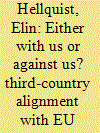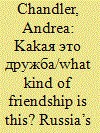| Srl | Item |
| 1 |
ID:
151315


|
|
|
|
|
| Summary/Abstract |
Since the mid-1990s, selected neighbours have in impressive numbers aligned with European Union (EU) foreign policy sanctions. However, much more than for any other sanctions case, neighbours have declined joining recent measures against Russia/Ukraine. This article uses freshly gathered data from the entire period of the Common Foreign and Security Policy (CFSP) to analyse how the practice of alignment influences international relations in Europe. Thereby, the article demonstrates that: (1) sanctions are not a two-party game, but an instrument that impacts broadly on relations with third countries; (2) alignment with sanctions not only articulates similarity, but contributes to normative polarization in wider Europe; (3) for a high-salience case such as Russia sanctions, neighbours are reluctant to be instrumentalized for EU foreign policy purposes.
|
|
|
|
|
|
|
|
|
|
|
|
|
|
|
|
| 2 |
ID:
102304


|
|
|
|
|
| Publication |
London, Routledge, 2010.
|
| Description |
xvi,206p.
|
| Standard Number |
9780415552165, hbk
|
|
|
|
|
|
|
|
|
|
|
|
Copies: C:1/I:0,R:0,Q:0
Circulation
| Accession# | Call# | Current Location | Status | Policy | Location |
| 055739 | 341.242/POR 055739 | Main | On Shelf | General | |
|
|
|
|
| 3 |
ID:
160088


|
|
|
|
|
| Summary/Abstract |
Russia’s 2014 annexation of Crimea without the consent of Ukraine was a rare case of a state taking territory from a state with whom it previously enjoyed friendly relations. The paper seeks to explain the causes and consequences of this annexation by examining theories of democratic peace, constructivism and irredentism. In 1971, political scientist Myron Weiner published an article “The Macedonian Syndrome” in the journal World Politics (vol. 23, no. 4, 665–683). In particular, the paper examines the applicability of Weiner’s theses to Russia’s 2014 attempt to annex Crimea from Ukraine. While Weiner’s theory helps to explain Russia’s moves, his theory can be updated to consider the consequences of those moves. Russia attempted to justify its annexation by transposing the concept of friendship from Ukraine itself to a piece of its territory – Crimea. This transposition rested on a false dichotomy between Ukraine and Crimea, and Russia’s failure to live up to its international commitments to respect Ukrainian borders brought swift consequences in the form of Western sanctions.
|
|
|
|
|
|
|
|
|
|
|
|
|
|
|
|